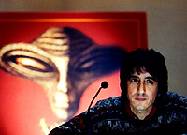|
|
||||
|
|
by Donald Levit  One of seventeen old and new features plus eight shorts (two animated) in Lincoln Center's third annual "Open Roads: New Italian Cinema," running May 30 through June 12, La Forza del Passato is a nicely tuned intriguing mystery, albeit not in any traditional detective-whodunit vein. Rather, the questions are, what-was-done, and can definitive lines even be drawn between the real and the illusory, objective and subjective, external and internal, true and false? The alternative English title-translation is a better choice: not the literal The Power of the Past but the suggestively accurate aka, Truth and Lies. Indifferent to "who was right or wrong," director/co-screenwriter Piergiorgio Gay astutely transfers the action from the Rome of Sandro Veronesi's book -- the novelist served as consultant -- to Trieste, an Adriatic port appropriately neither fully Free Territory Zones A and B nor Italian nor Yugoslav. Easy voice-over is consciously rejected as a replacement for the book's past-related interior monologues, to become instead movie dream-sequences where the protagonist-author's trademark fictional creation emerges as that author's own questing alter ego. In a switch from usual mysteries, this one features no actual "crime," nor, aside from final determinations about controlling one's personal life, can there be any "resolution," since "everyone has his own reality." Successful author of the "Qwerty Uiop" children's series, loving husband, doting father, Gianni Orzan (Sergio Rubini) is nonetheless a sad-faced, sad man. Unable to escape the presence of the reactionary, fascist officer father (Aleksander Krosl) who exiled him to Jesuit and military boarding schools and whom "I couldn't stand," Gianni has no photos of the man and does not bother to change his casual clothes to attend the latter's formal official funeral. Capable of selflessness, in a puzzlingly extraneous moment he donates an $8,000 literary prize to an unknown woman who requests charity for her comatose son and who later reappears to thank, and tempt, him. Still, he exists merely on the periphery of real, emotionally committed life, about which he learns from films and popular music and by appropriating others' characters for his muse. Into his world, however, a strange foreigner literally forces himself. This Gianni Bogliasco (Bruno Ganz) uses a variety of alias surnames, may or may not fire the pistol in his belt, wear Bulgarian or American shirts, drive a stolen jeep, have been in a staged accident in Amsterdam or died at Leghorn. He claims to be a lonely wanderer, a former Russian spy, the man after whom Gianni was named and his officer-father Maurizio's lifelong confidant and bosom friend, come to reveal the great secret-and-lie of that father's life despite a deathbed request to the contrary. Writer Gianni initially suspects and rejects the capricious intruder but falls under his spell, alternately accepting then disbelieving these assertions. Like Gianni, we are never sure of the whole truth, as even his briefly seen mother Emma (Valeria Moriconi) confirms the solemnity of not revealing essential secrets. Hitherto passive, in non-traditional fashion this hero is active in resisting, not seeking, knowledge, as past and present coalesce into sense. Through his own imaginative dream-world, and symbolized by a returned copy of his father's loving translation of And Quiet Flows the Don, the son grows to accept as more or less true this new version of his father as a man whose very name and outer life were a falsehood and sacrifice to duty. Hospitalized after an accident, pleading a "small memory loss," a deliberate choosing of the past in which one believes, Gianni chooses to reinvent himself, his past and present lives, his family and marriage. Departing on a ship, the unsettling mysterious stranger reflects that he "creates" truth and has long journeys still to make. Mortal and yet a figment of anyone's imagination, filled with dubious tales and facts, he is nevertheless a bringer of something far more deeply interfused, a kind of spiritual psychological savior. Deftly, never hammering its point, The Power of the Past/Truth and Lies uncovers the truth of what the individual must accept if he is to be free to live with himself and, therefore, with others. (Released by Adriana Chiesa Films; not rated by MPAA.) |
||
|
© 2024 - ReelTalk Movie Reviews Website designed by Dot Pitch Studios, LLC |



